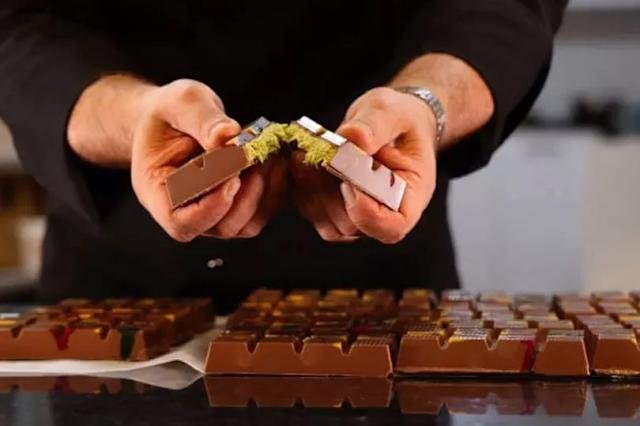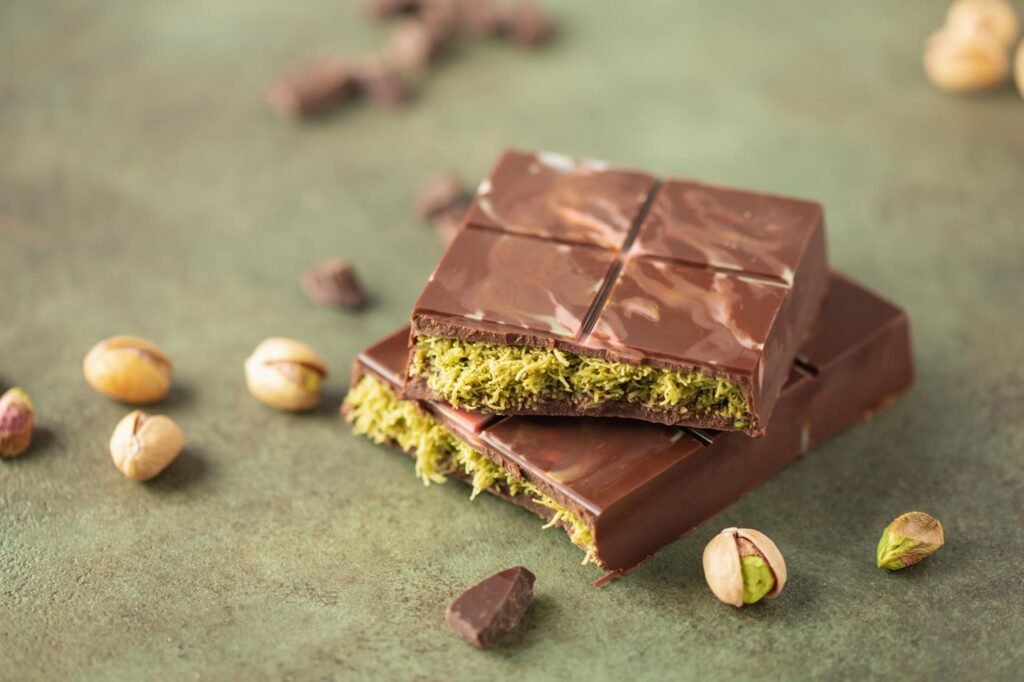A sharp rise in consumer complaints has triggered an urgent alert from food safety watchdogs about a viral chocolate trend sweeping across supermarkets and social media alike: Dubai chocolate. While this rich, pistachio-packed treat has delighted dessert lovers across the globe, authorities are now warning that it could pose serious health risks for people with nut, sesame, and dairy allergies.
The concern? Inadequate labeling. Some imported batches have either failed to list all potential allergens or used unclear translations, making it difficult for allergy sufferers to make informed decisions. For a growing population that lives with food sensitivities, this oversight could turn indulgence into emergency.
From Viral Sensation to Safety Concern
Dubai chocolate exploded onto the global scene through food bloggers, influencers, and trend chasers showcasing the gooey, pistachio-heavy bars oozing flavor. Its appeal lies in the fusion of Middle Eastern ingredients—like tahini, rose water, and knafeh textures—with high-end presentation.

But beneath the shiny gold wrappers and Instagram-worthy drips lies a problem: inconsistent or misleading labeling. Watchdogs reviewing several brands found missing allergen declarations, incomplete ingredient lists, and vague terminology like “vegetable oils” instead of listing potential triggers like palm oil or soy derivatives.
For the average chocolate lover, this might be a mild inconvenience. For someone with a severe nut or sesame allergy, it could be life-threatening.

Why Allergy Labelling Matters More Than Ever
Food allergies are not a niche concern—they’re a growing public health issue. Millions of consumers rely on clear, visible packaging to avoid dangerous ingredients. European and international standards require major allergens (like nuts, dairy, gluten, sesame, soy) to be listed clearly and consistently.
However, imported novelty foods often don’t meet these expectations. Some Dubai chocolate products have used non-standardized labelling, or included foreign languages without accurate translations. Even more concerning are the vague claims like “may contain traces” that don’t specify what allergens are at risk.
This has led to several near-miss incidents, including customers reportedly suffering mild to moderate allergic reactions after consuming the treat. Thankfully, no major hospitalisations have yet been linked to it—but the warning signs are enough to cause a serious industry stir.
What’s Actually In Dubai Chocolate?
A key challenge for allergy sufferers is understanding the exact composition of these trendy bars. Popular variations typically include:
- Pistachio or mixed nuts (hazelnut, almond)
- Sesame-based tahini
- Creams or condensed milk
- Glazes containing glucose syrup or gelatin
- Decorative elements like edible gold or rose petals
- Unlabelled oils, often palm-based or soy-derived
What sounds luxurious to some can be a dangerous cocktail for others, especially when cross-contamination isn’t declared.

Authorities Step In: Protecting the Public
Following consumer complaints and increased online discussions, food regulators have launched a formal inspection campaign. Authorities are now:
- Testing products for allergen content
- Reviewing labels for accuracy and compliance
- Contacting importers to revise packaging
- Encouraging retailers to temporarily remove non-compliant batches
Retailers are also stepping up by offering refunds and limiting quantities per customer while investigations continue. Many stores have implemented an “only certified stock” policy for Dubai chocolate moving forward.
This crackdown isn’t about banning the treat—it’s about making sure it’s safe, clear, and responsibly sold.
The Silver Lining: Industry Improvement Already Underway
While the watchdog’s warning is serious, it’s also sparking positive changes. Some Dubai-based confectionery producers have responded swiftly, updating their packaging with multilingual allergen declarations and revising recipes to remove ambiguous additives.
Importers and resellers, feeling the pressure of both public scrutiny and regulatory enforcement, are now more cautious about what they put on shelves. This creates a rising standard across the board—not just for chocolate, but for all specialty foods entering the global market.
In the long run, these reforms could elevate the entire food import industry, giving allergy sufferers more trust in what they buy.
What Consumers Should Do Right Now
If you’re a chocolate lover with a food allergy, here are some smart steps to stay safe while still enjoying what you love:
- Check every label, every time.
Even if you’ve bought the same product before, a different batch may have different labeling or ingredients. - Avoid non-English or unclear packaging.
If you can’t read the label confidently, don’t risk it—especially if you have a serious allergy. - Shop with allergen-aware retailers.
Many larger or specialty grocery chains are now actively verifying allergy declarations before stocking products. - Report concerns or reactions.
If a product gives you a reaction or lacks proper allergen info, report it to your local food safety authority. - Carry your medication.
Always have your prescribed allergy treatment (like antihistamines or epinephrine) on hand just in case.
Dubai Chocolate: Still Delicious, Just Needs Safer Delivery

Let’s be clear: Dubai chocolate is not the enemy. It’s a rich, innovative dessert that has captivated fans for good reason. But global popularity brings global responsibility.
No treat is worth putting someone’s life at risk. A few simple changes—clearer labeling, better translations, and honest declarations—can mean the difference between indulgence and danger.
The fact that the industry is reacting so quickly to this watchdog alert is a sign of progress. If manufacturers, importers, and retailers continue to take feedback seriously, Dubai chocolate can return to shelves stronger, safer, and more inclusive than ever.
Looking Ahead: Safer Trends, Stronger Trust
This situation is part of a broader shift: today’s consumers expect transparency. Whether it’s Dubai chocolate, Korean instant noodles, or plant-based snacks from the U.S., buyers want to know what they’re putting into their bodies.
Food safety isn’t just about preventing illness—it’s about building trust. When consumers feel confident that their needs are understood and respected, they become loyal fans—not just trend followers.
So while this alert may have caused concern, it also signals something hopeful: that global food culture is growing up.
And that’s a future worth tasting.
Do follow UAE Stories on Instagram
Read More: Abu Dhabi Launches Landmark Child Protection Policy for Sports Sector














